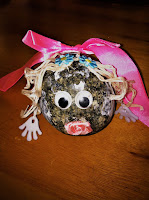Horatio - Stone of Heart & Hope
“’Hope is the thing with feathers”
 |
| Before lockdown, all dressed up and ready to go. |
I taught
English for 39 years. For most of those years, I had a faithful classroom
companion. My pet rock, Horatio. He became a legend. If you ask him for his
story, he will maintain a stony silence, but I feel compelled to speak on his
behalf and on the behalf of all unrecognized treasures that give us hope.
I love
stones and rocks; I have always had a passion for them. I can remember as a
little girl of seven or eight, spending a Christmas holiday searching a lush
Uvongo tropical garden searching for the perfect stone. There were banana
trees, frangipani and hibiscus hiding ants and geckos. I adventured like a
little Durrell amongst them until I found my stone, it was beautiful. The
smooth surface was cool in my hand, solid and telling me stories. I washed and wrapped
it. I can still see the paper, green with tiny silver stars. On Christmas
morning, I gave my mom her gift. She put
 |
| Social distancing - watching birds and reading poetry. |
We were a
large family, mom, dad, four brothers and I, all competed for attention. Once
all the presents had been opened, it was time to clear the lounge floor. It was
my job to pick up the discarded wrapping paper. I gathered the paper, but there
was a heaviness in the pile. Under its shiny, green, star paper, was my rock. I’m
not sure why that moment has stayed with me, it was just a rock. I think I
understood then, in a very childlike way, that I didn’t see the world others
saw it. What was treasure for me didn’t always have the same meaning for
others but it could still be mine.
Many years
later, a rock was given to me by the mother of a dear friend. He wasn’t wrapped
or named, simply put into my hands with his stony, eggy shape fitting into the
curve of my palm. I was a young teacher then and it was back in the day when
pet rocks were a thing. He came to school and took up residence on my desk. I
named him Horatio Hornblower after C S Forester’s naval captain. I have no idea
why, it just seemed to fit.
The story
around Horatio grew. He was a failed rock star who had his own version of ‘Rock
Around the Clock’, but Bill Haley and then that wannabe, Elvis, had taken his
shine. Like many rock stars, he spent years being stoned. He refused to eat and
battled with anarocksia. At night, I would sing him ‘Rock-a-bye baby’. You get
the idea.
Horatio
lived a dangerous, swashbuckling life. He was often kidnapped and held to
ransom. I would find a note on my desk demanding a free period or cake for the
class in return for his freedom. I was sent photographs showing Horatio in
precarious positions, on a stove, under a saw and even on a beach, tanning and
threatening not to come home. He went to a Valentine’s Ball and had scarves
knitted for him and fashion outfits made. At times, for the safety of the
class, he would be confined to his cage. The wooden cage was made by my
grandfather, who always supported me in my madness.
Beneath his
hard exterior, Horatio has a gentle heart. Beyond the fun, Horatio served a
purpose and that was to give a timeout to those who needed it, including
myself. The girls knew that if they asked to take Horatio for a walk, they would
be allowed to leave class for as long as they needed, just to take a breath.
Horatio has been on many walks and I don’t think his purpose was ever abused.
Horatio was
a symbol of permission to find a quiet space in the midst of distress or noise.
No explanations were needed; no explanation was asked for when Horatio
returned. Everyone understood and just let the person be.
 |
| Emily Dickinson |
We all need
to take Horatio for a walk sometimes. This seems especially important now as we
spend prolonged periods of time shut up in our homes. The silliest things can
make us smile and bring us comfort – share your treasures. Have something that
signals a timeout. Even if you are in a small space you can have a shower or go
out and just sit in your car and be quiet or listen to music.
I took some
time with Horatio today. He was reading an Emily Dickinson poem, ‘Hope is the
thing with feathers’. I thought of the little girl wrapping stones, finding treasure
where there was none. As I look back over my life, I’ve found treasure in the
most unexpected places. Perhaps trasure will come from this terrible time.
The biggest treasure that we can find for ourselves and
then for others, is hope. Hope, as Dickinson reminds us, asks nothing of us, but
like the birds, is ready to be found.
You have
permission. Take a moment to find a place of hope. When you have found it,
share it with someone else. Even if it’s as small as a smile or a silly post on
Facebook.
“‘Hope’ is the thing with feathers -/ That
perches in the soul-/ And sings the tune without the words-/And never stops -
at all-“…
It never
stops – at all.


Comments
Post a Comment